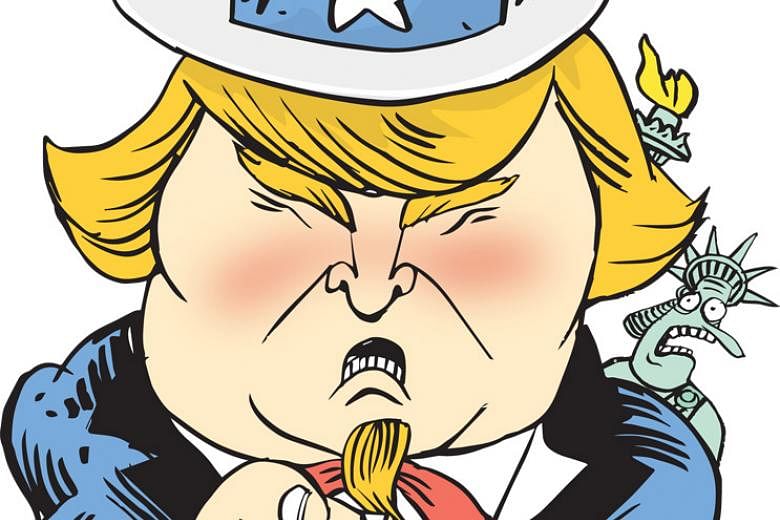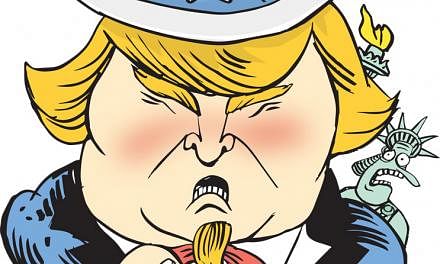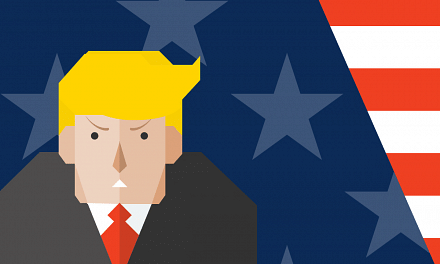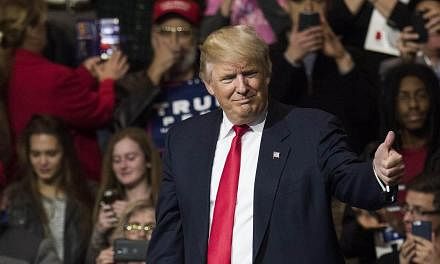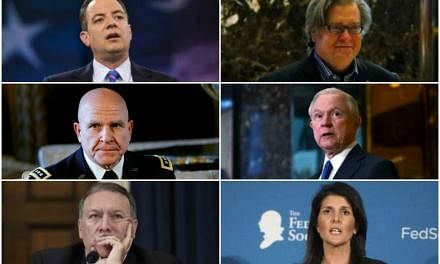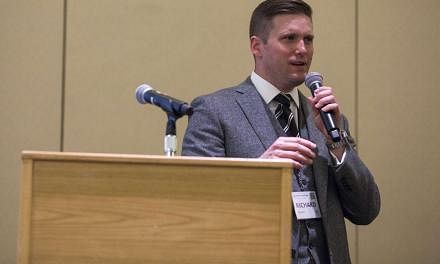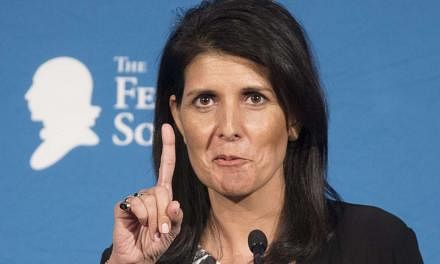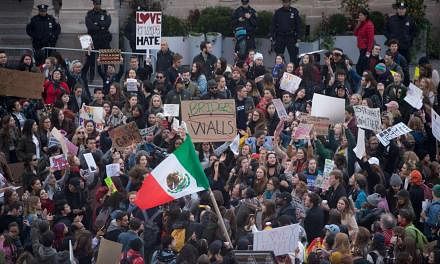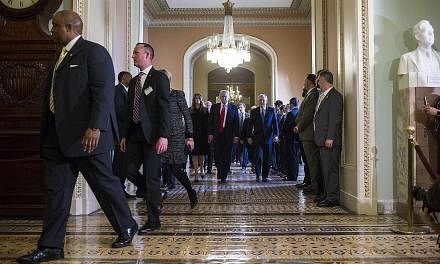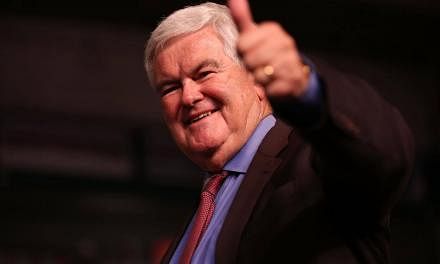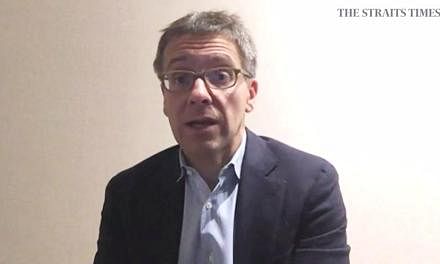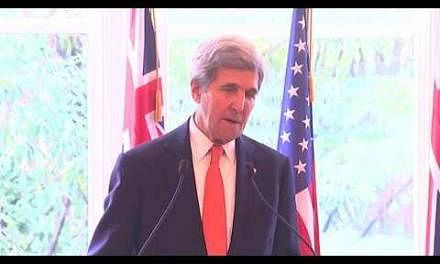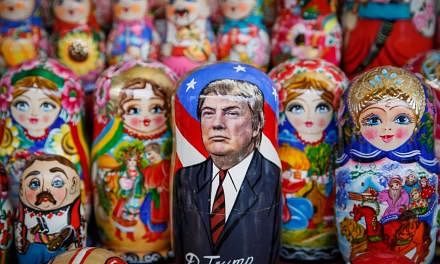LONDON • The daily parade of anxious people traipsing through the gold-plated, camera-filled lobby of Trump Tower, eager to discover whether they'd be offered a position in the incoming US administration, is now over.
President-elect Donald Trump still has to fill hundreds of lower-rung vacancies, but all the major Cabinet positions have now been filled, providing us with a first serious glimpse into how Mr Trump proposes to rule. The indications are that the new administration, which will assume power precisely a month from today, will be radically different from all its predecessors. Fasten your seat belt in preparation for a long roller-coaster ride.
Initially stunned by Mr Trump's unexpected electoral victory, diplomats around the world have consoled themselves with the hope that, once in power, "The Donald" will have to jettison the hasty pledges and half-baked policies he proposed during the electoral campaign and acknowledge the responsibilities of office. Washington bureaucrats and Congress, the received wisdom argued, would soon bring Mr Trump to "his senses".
But it is now clear that the worst mistake foreign governments can make is to "normalise" Mr Trump, to assume that despite his initial bluster, he'll end up being more or less like his predecessors. For all of his Cabinet appointments point in precisely the opposite direction.
The President-elect had plenty of seasoned politicians and policy professionals to draw upon in forming his administration; after all, the last Republican sat in the White House less than a decade ago, and the Republicans have run Congress for most of the time since then, so the pool of good talent is pretty wide. And although most of these Republican "old hands" were not natural Trump supporters, many of them would have been flattered to be included, and quite a few could have added lustre and gravitas to a President-elect who has no previous government experience.
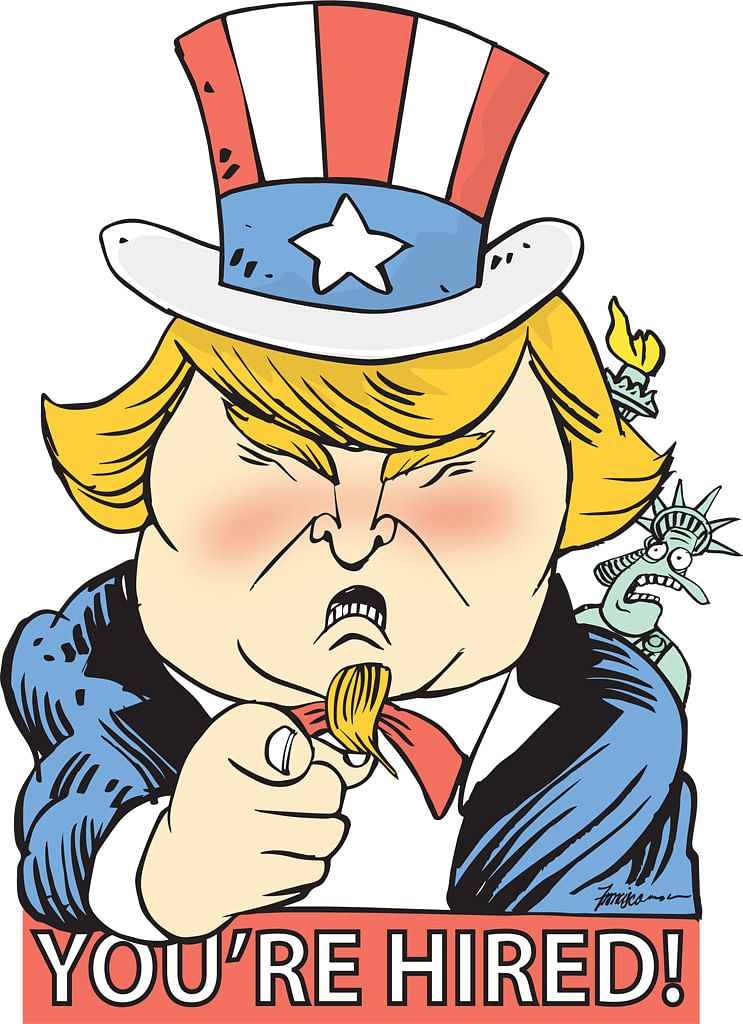
But that logic never appealed to Mr Trump, who instead chose to compound his outsider image by surrounding himself with even a greater number of outsiders. And for understandable reasons. For the man often dismissed by America's establishment as just an amusing irrelevance has no intention of co-opting those who never cared to co-opt him. Besides, Mr Trump knows that he was elected precisely because he's not the establishment, so "domesticating" himself to the ways of doing business in Washington makes no electoral sense either.
True, Mr Trump's Cabinet hardly appears anti-establishment. In fact, it resembles the last cry of the old order, rather than the dawn of a new one: all the top positions are held by rich, middle-aged white men, who between them have an estimated combined US$50 billion (S$72 billion) worth of personal assets, equivalent in size to the national economies of around half of the countries around the world.
It's much more plausible, therefore, that a controversy inside the Trump Cabinet would erupt over the benefits of membership in various golf clubs, rather than the merits of US membership in a military alliance. Still, Mr Trump's Cabinet appointments are revolutionary, in subtler ways which will soon become clear.
EXECUTE ORDERS, DELIVER RESULTS
There are two main categories of people promoted by Mr Trump to Cabinet rank: senior military officers and very senior businessmen; academics and lawyers, the fodder of previous administrations, were not even considered for posts. The choice of generals and businessmen tell us a lot about the qualities the President-elect values in people, and the style of government he prefers.
The military generals can be expected to do as they are told and execute the orders as these are given, rather than confront Mr Trump with reasons as to why certain things cannot be done. And the billionaire businessmen he selected are all expected to deliver in an equally unstinting way national economic transformation; no ifs, no buts, just delivery.
Yet there is a deeper logic to these appointments, for all were filled by people who, in one way or another, distinguished themselves by being both successful in their careers and awkward rebels at the same time.
General Michael Flynn, now National Security Adviser, tried to implement a radical reform of the country's Defence Intelligence Agency, before he was flushed out by the establishment.
General James Mattis, Mr Trump's choice for Pentagon chief, was known as "Mad Dog" for his opposition to President Barack Obama's Middle East policy, a moniker the President-elect loves.
And then there is General John Kelly, the new Homeland Security Secretary who lost a son to the Taleban in Afghanistan and is an outspoken critic of the current US counter-terrorism strategy.
The same tendency towards the unusual and the rebel is also observable among the businessmen recruited into government. Mr Steven Mnuchin, the new Treasury Secretary, abandoned a family-wide association with Goldman Sachs and went instead to produce movies such as Batman v Superman.
Mr Wilbur Ross, in charge of the Commerce Department, is known on Wall Street as the "king of bankruptcy" for his speciality of buying and then turning around failed companies, not exactly mainstream business.
Mr Andrew Puzder, the new Labour Secretary, spent a lifetime trying to defend his fast-food restaurant chains from what he sees as the curse of the minimum wage for workers, yet again not a popular pastime among businessmen.
And then, there is Secretary of State Rex Tillerson, the mega oilman who did not spend much time paying attention to anyone apart from Russia's President Vladimir Putin.
The conclusion seems, therefore, inescapable: Mr Trump expects obedience, but he also expects his ministers to crack open, rather than work with, the system.
FIGHTS WITH CONGRESS
Predictions about how this administration will behave in a month from now can only be highly tentative; it is not even clear whether all of Mr Trump's candidates will be confirmed by Congress, and in some cases - such as that of Gen Mattis - Congress will have to issue an exemption to allow them to serve in government so soon after leaving active military service.
Still, some forecasts can be made. It is almost inevitable that, sooner rather than later, the administration will be embroiled in heavy disputes with Congress, if only because, with the notable exceptions of Vice-President Mike Pence and Attorney-General Jeff Sessions, nobody in the new government has any experience with dealing with legislators. It is also virtually certain that Mr Trump's ministers will end up quarrelling with each other; there are too many big egos of big men around, and too little of the habit of cooperation.
And in any case, the ranks held by officials will tell us little about their actual power; it's quite possible that someone like Mr Jared Kushner, Mr Trump's son-in-law, will get no official role, but will enjoy huge influence on a cliquish presidency which makes no distinction between private and public life.
Either way, it is virtually certain that this will be an administration which sees America's international footprint not in terms of shared values or shared history, but in purely transactional terms, similar to the commercial deals which its ministers made and unmade in their previous careers. The cavalier way by which the President-elect treats the US intelligence agencies and his steadfast refusal to be impressed by intelligence material is one indication that this won't be an administration sticking to known rules, conventions or assumptions about the use of American power.
A classic and early foretaste of things to come was provided by Mr Trump's recent decision to take a phone call from Taiwanese President Tsai Ing-wen. He presented this gesture - which seemed to upend four decades of US respect for the "one China" principle - as a matter of respect for a democratically elected Taiwanese leader. But Mr Trump also immediately suggested that he could return to upholding the "one China" principle if the Chinese government offered him some strategic concessions, another way of saying that Taiwan, which he now respects, can also be bartered away if the price was right.
Nobody knows whether this Taiwan episode is either a fiendishly shrewd manoeuvre by the US President-elect, a clever way of putting additional pressure on China, or whether it is just a by-product of ignorance and inexperience.
But that's a dilemma which is bound to face governments around the world for quite some time, as they come to terms with the new administration and its ways of doing business. For being both unconventional and unpredictable may well remain the new president's trump card.

